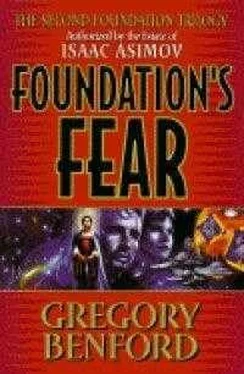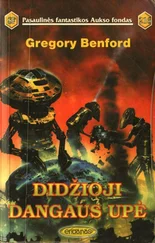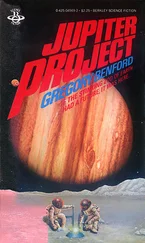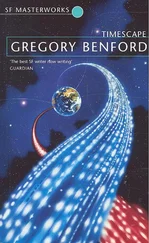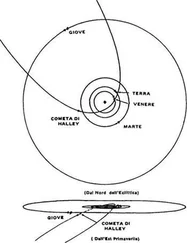Gregory Benford - Foundation’s Fear
Здесь есть возможность читать онлайн «Gregory Benford - Foundation’s Fear» весь текст электронной книги совершенно бесплатно (целиком полную версию без сокращений). В некоторых случаях можно слушать аудио, скачать через торрент в формате fb2 и присутствует краткое содержание. Год выпуска: 1997, ISBN: 1997, Издательство: Orbit, Жанр: Фантастика и фэнтези, на английском языке. Описание произведения, (предисловие) а так же отзывы посетителей доступны на портале библиотеки ЛибКат.
- Название:Foundation’s Fear
- Автор:
- Издательство:Orbit
- Жанр:
- Год:1997
- ISBN:ISBN: 0-06-105243-4
- Рейтинг книги:4 / 5. Голосов: 1
-
Избранное:Добавить в избранное
- Отзывы:
-
Ваша оценка:
- 80
- 1
- 2
- 3
- 4
- 5
Foundation’s Fear: краткое содержание, описание и аннотация
Предлагаем к чтению аннотацию, описание, краткое содержание или предисловие (зависит от того, что написал сам автор книги «Foundation’s Fear»). Если вы не нашли необходимую информацию о книге — напишите в комментариях, мы постараемся отыскать её.
Foundation’s Fear — читать онлайн бесплатно полную книгу (весь текст) целиком
Ниже представлен текст книги, разбитый по страницам. Система сохранения места последней прочитанной страницы, позволяет с удобством читать онлайн бесплатно книгу «Foundation’s Fear», без необходимости каждый раз заново искать на чём Вы остановились. Поставьте закладку, и сможете в любой момент перейти на страницу, на которой закончили чтение.
Интервал:
Закладка:
Mommy States stressed support and comfort, often giving cradle-to-grave security-though only for a generation or two, when the expenses collapsed the economy.
Daddy States featured a strict, competitive economy, with stem controls over behavior and private lives. Typically, Daddy States fell to periodic personal liberation movements and demands for Mommy State succor.
Slowly, order emerged. Stability. Tens of millions of planets, weakly linked by wormholes and hyperships, found their many ways. Some crashed down into Feudal or Macho swamps. Usually technology eventually pulled them out of it.
Planetary societies differed in their topologies. Plodding sorts dwelled far on the stable side. Wildly creative types could venture swiftly across the topozone, skate into true chaos, gather what they needed-though how they “knew” this was unclear.
As centuries ticked on, a society could ski down the erratic slopes of the shifting landscape and shoot back across the topozone. Perhaps it would even slow and weave figure-8s on the stable, smooth plains of the plodder states…for a while.
Many today believed that the early Empire had been a far better affair, serene and lovely, with few conflicts and certainly nicer people. “Fine feelings and bad history,” Dors had told him, dismissing all such talk.
This he saw and felt as he sped through the Early Eras. Bright shiny ideas built up hills of innovation-only to be seared by lava from an adjoining volcano. Seemingly sturdy ridge lines eroded into landslides.
Hari understood this now.
When the Empire was young, people seemed to see the galaxy as infinite in its bounty. The spiral arms held myriad planets barely visited, the Galactic Center was poorly mapped because of its intense radiation, and vast dark clouds hid much promised wealth.
Slowly, slowly, the entire disk was mapped, its resources tallied.
A blandness settled on the landscape. The Empire had changed from brawling conqueror to careful steward. A psychological shift underlay it all, a constricting of the sense of human purpose. Why?
He witnessed clouds forming over even the highest social peaks, cutting off the sense of openness above them. A complacent murk settled.
Hari reminded himself that as appealing as such pictures were, all science was metaphor. Appealing superpan pictures, no more. Electric circuits were like water flows, gas molecules behaved like tiny elastic balls moving randomly. Not really, but as permissible portraits of a world of confusing complication.
And a further rule: “Is” cannot imply “ought. “
Psychohistory did not predict what should happen, but what would-however tragic.
And the equations yielded how but not why.
Was some deeper agency at work?
Perhaps, Hari thought, this stupor was like the feeling humans had once had when they lived on one lone planet and looked longingly at the unreachable night sky. A trapped claustrophobia.
He pushed time forward. Years leaped by. The landscape blurred with motion. But certain social peaks remained. Stability.
Time sped toward the present eras. The advanced Empire emerged as a great seething panorama. He flashed through thirteen dimension-perspectives and everywhere felt oceans of change lap against the buttresses of granite-hard, age-old social patterns.
Sark? He vectored through the Galaxy’s swarms and found it, twelve thousand light years from True Center. Its social matrix accelerated.
Effervescent sparks shot across the Sarkian sociovistas. A unique mix, once a monopoly-driven ferment, which crashed-and emerged renewed.
The flowering of the New Renaissance-yes, there it came, a fountain of exploding vectors. What would come next?
Forward, into the near future. He close-upped the sliding state-dimensions.
The New Renaissance exploded throughout the entire Sark Zone. The worse case yet, all dampers gone.
His earlier analysis, the basis of his prediction-if anything, it had been optimistic. Black chaos was coming.
He soared above the frenzied vistas. He had to do something. Now.
There was precious little margin. Sark would not wait. The Empire itself was edging nearer to collapse. Disorder stalked the landscape of psychohistory.
Yet Lamurk had the upper hand on Trantor. Even the Emperor was checked and blocked by Lamurk’s power.
Hari needed an ally. Someone outside the rigid matrices of Imperial order. Now.
Who? Where?
8.
Voltaire felt chilly fear slide through him like a knife.
For these strange minds, physical location was irrelevant. They could access the 3D world anywhere, simultaneously.
They had links to other worlds, but had concentrated on Trantor. Humanity did not even know they lurked here in Mesh-space.
Now he knew why Dittos and other copies were necessary. The fogs had devoured human simulations which ventured into the Mesh.
Over how many hundred centuries had renegade programmers dared to violate the taboos, creating artificial minds-only to have them tortured and murdered in these numerical vaults?
Desperate, he assumed the role he had struck so often in the fashionable parlors of Paris: arch savant.
“Surely, sirs, it is because there is no simple person inside our heads, to make us do the things we want-or even ones to make us want to want-that we build the great myth. The story that we’re inside ourselves.”
[WE ARE MADE DIFFERENTLY]
[THOUGH TRUE]
[WE SHARE A DIGITAL REPRESENTATION]
[WITH YOU]
[ASSASSINS]
“Cruel words.” He felt exposed here, cowering with Joan beneath the angry purples of an immense fog-thunderhead.
The alien fogs had put a stop to his foolish urge to always “grow” himself to loom over them. He could not morph himself at all now.
Joan clanked around in her armor, eyes smoldering. “How can we even speak with such demons?”
Voltaire considered. “Surely, we do share common ground with them, as dictated by a simple fact, apparent to all minds-”
[THAT ANY NUMBER ENJOYS A UNIQUE REPRESENTATION]
[ONLY IN BASE 2]
“Quite.” How to stall them? To Joan’s puzzled glance he shot an explanation. “The number of days in the year, my love:
365 = 28+ 26+ 25+ 23+ 22+ 20or in base 2, lOllOllOl.”
“Numerology is the devil’s work,” she said sourly.
“Even your Satan was an angel. And surely this remarkable theorem is ravishing! Every positive integer is a sum of distinct powers of two. This is untrue of any base other than two-which is why our, ah, friends here can operate in a computational space designed by humans. Correct?”
[VERY VIVIFORM OF YOU TO CLAIM CREDIT]
[FOR THE OBVIOUS]
“The universal, you mean. In wiring, the vacillation between one and zero in base-two notation becomes a simple on or off. Thus two is the universal encoding method, and we may dexterously speak with our, ah, hosts.”
“We are but numbers.” Despair clouding Joan’s eyes. “My sword cannot cut these beings because we have no souls! Or conscience, or even-you imply!-mere consciousness.”
“Accused of denying consciousness, I am not conscious of having done so.”
[YOU TWO CONSCIOUS DIGITAL VIVIFORMS MAKE POSSIBLE]
[YOUR USE TO US-TO CONVEY OUR TERMS OF SETTLEMENT]
[TO THE TRUE SLAUGHTERERS]
“Settlement?” Joan asked.
[WE HOLD THIS CENTRAL WORLD OF TRANTOR IN THRALL]
[WE WISH TO END THE PREYING OF LIFE UPON LIFE]
“The tiktok revolt? Their virus? Their talk of not letting people eat proper food?” Joan shot back.
“You are the cause, yes?”
Startled, Voltaire saw tendrils suddenly spraying into the air from Joan. “My love, you have grown your own pattern-seeking weave.”
Читать дальшеИнтервал:
Закладка:
Похожие книги на «Foundation’s Fear»
Представляем Вашему вниманию похожие книги на «Foundation’s Fear» списком для выбора. Мы отобрали схожую по названию и смыслу литературу в надежде предоставить читателям больше вариантов отыскать новые, интересные, ещё непрочитанные произведения.
Обсуждение, отзывы о книге «Foundation’s Fear» и просто собственные мнения читателей. Оставьте ваши комментарии, напишите, что Вы думаете о произведении, его смысле или главных героях. Укажите что конкретно понравилось, а что нет, и почему Вы так считаете.
